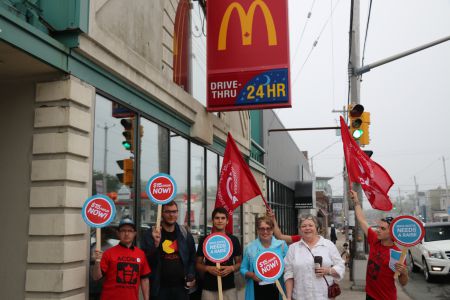KJIPUKTUK (Halifax), Nova Scotia -- This morning, July 15th, 2015, Halifax's 'Fight for Fifteen' campaign took their struggle for a liveable minimum wage to the front door of the Quinpool Road McDonald's restaurant. In targeting the fast-food giant, the Halifax campaign follows in the footsteps of the groundswell 'living wage' movement in the United States, which has seen tens of thousands – many of them workers in the fast-food industry - show up in calls for action in major American metropolises.
In the recent past, McDonald's, the company, has not been immune to this type public pressure. In early April, 2015, McDonald's announced that employees at company-owned restaurants in the United States would, by the end of 2016, see their earnings rise on average one dollar above the minimum wage in their respective legislative boundaries. By no means did this come close to fifteen dollars an hour, but it was a chink in the armour.
At the time, McDonald's Canada did not follow suit with a similar 'goodwill' measure, perhaps in direct relation to the lack of a similar, widespread, Canadian protest movement. Instead, McDonald's Canada issued a press release in which it noted that of the 22% of Canadian workers who work in a company-owned store, roughly “two thirds” of hourly employees are already “paid above the provincial minimum wage”.
“McDonald's is one of the highest low-wage employers in the country,” notes 'Fight for Fifteen' activist Evan Coole. “Their business model shows why we need a higher minimum wage. They make massive profits, millions of dollars in profits globally every year, while their workers are struggling to get by.
The 'Fight for Fifteen' is now a Canadian coast to coast phenomenon, with actions in B.C, Ontario and Nova Scotia. Now that we're a national movement we hope that we can start moving an employer like McDonald's to start paying better wages.”
McDonald's Canada, with a management monitor at this morning's Halifax protest, was quick to respond with the following email statement:
'At McDonald’s Canada we respect everyone’s right to have their say. The topic of minimum wage in Canada goes well beyond McDonald’s. We look to individual provincial legislators to determine appropriate minimum wages across the country. McDonald’s Canada and our franchisees are guided by what is provincially legislated. In fact, entry-level wages often exceed mandatory provincial minimum wages.
McDonald’s and our franchisees value our respective employee’s contributions by offering competitive wages, educational assistance and access to other incentive programs. McDonald’s is a pay-per-performance employer with regular performance and wage reviews, and we offer a competitive package to attract and retain our employees.
McDonald’s Canada and our franchisees are proud to be employers of choice in Canada to more than 85,000 employees coast-to-coast.'
The case of McDonald's aside, the 'Fight for Fifteen' has won victories in San Francisco (where a phased-in approach will see minimum wage hit $15/hour in several years), as well as in the Seattle suburb of SeaTac. While the economic sky has not fallen in either jurisdiction, there have been grumblings, especially from the restaurant industry where profit margins are generally understood to be thin, that the price of goods and services has experienced a lockstep increase.
At the Halifax rally, Evan Coole doesn't buy the logic that an increase in minimum wage necessarily leads to price spikes or small business closures.
“For small businesses, having the lowest paid workers with more spending power is actually quite advantageous,” says Coole. “Any business, large or small, depends on consumers for its profit. If a minimum wage worker made fifteen dollars an hour, they might consider going to their local coffee shop that charges a little bit more for a cup of coffee than Tim Horton's, or going to a local restaurant instead of a chain that has cheaper food because of underpaying their workers.”
Raising the minimum wage, in the context of what our expenditures are and where we spend our money, thus becomes one aspect of a larger discussion on where we would like to steer our society as a whole. Statistically speaking, minimum wage in and of itself has not kept up with across-board inflation, and workers working for minimum wage, full time, no longer reach basic standards of living.
“Fifteen dollars an hour would put a lot more dignity back in my life,” says 'Fight for Fifteen' activist Darryl King. “It would help me get back into society.”



